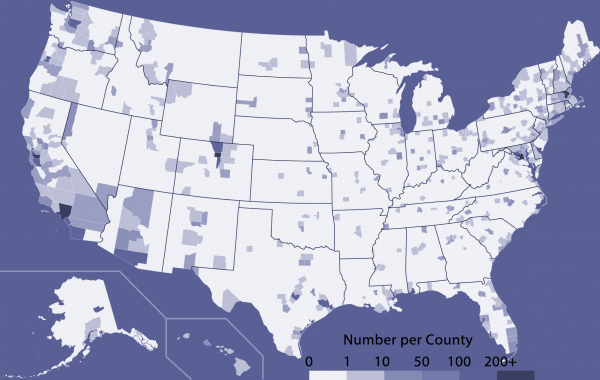17 June 2014
Science Communication in the Post-expert Digital Age
Posted by mcadams

This image shows the number of U.S. American Geophysical Union (AGU) members with a focus on global environmental change, by county. Image credit: Amy Luers and David Kroodsma.
By Ernie Balcerak
In the digital age, anyone can comment, tweet, or blog. This means that expert voices are often diluted in the online conversation.
In a Forum in the 17 June issue of Eos, Amy Luers, director for climate change at the Skoll Global Threats Fund and David Kroodsma, research analyst at the Skoll Global Threats Fund, describe the challenges for scientists trying to communicate in this “post-expert” age.
They point out that the digital world amplifies the geographic political polarization of American society, in which liberals and conservatives tend to live in communities dominated by people who share their political orientation. This geographic polarization is also reflected in the geographic distribution of climate scientists—nearly 80 percent of AGU members in the United States who work on global environmental change live in a county that voted for President Obama in 2012, and few climate scientists live in conservative regions of the country.
How can scientists overcome these barriers to effective communication? Luers and Kroodsma suggest that new strategies should involve going beyond simply reporting facts to joining diverse conversations and finding opportunities to use digital tools to facilitate the “coproduction of knowledge.” They conclude that it is time for scientists to “join the digital revolution and rethink its approach to public engagement.”
Read the full Eos Forum article here.
– Ernie Balcerak is a writer/editor for Eos, AGU’s member newspaper.


 The Plainspoken Scientist is the science communication blog of AGU’s Sharing Science program. With this blog, we wish to showcase creative and effective science communication via multiple mediums and modes.
The Plainspoken Scientist is the science communication blog of AGU’s Sharing Science program. With this blog, we wish to showcase creative and effective science communication via multiple mediums and modes.
The exception to the rule is Arizona, where I live. I can only assume this is due to the concentration of geology-related people here that counteract the conservative/liberal Obama/non-Obama trend. Or, I guess the indications here reflect the large territory our counties cover. I’m hoping the latter is not the case!